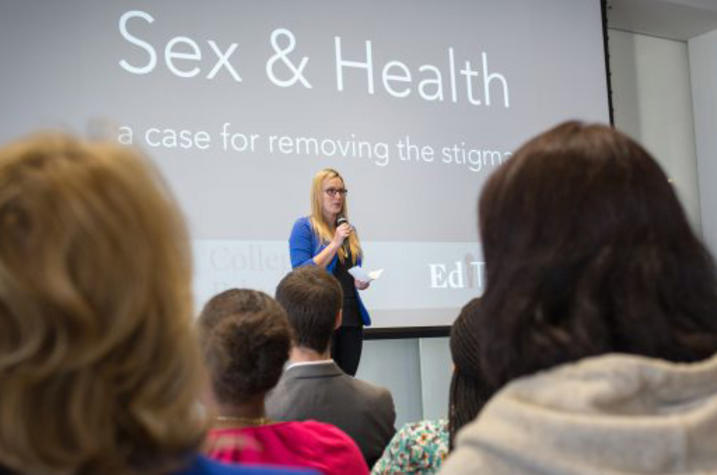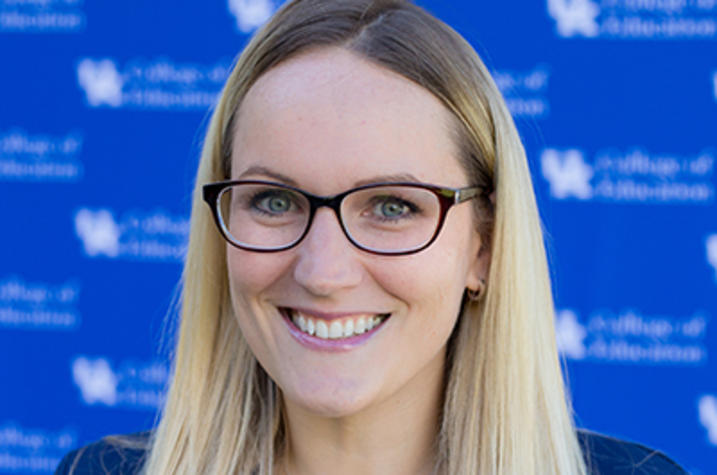Bringing Sex Ed Outside of School to Facilitate Sustainable Change
LEXINGTON, Ky. (June 14, 2019) — What if teen moms were given the chance to create the sex education they wish they had before they became pregnant? Associate Professor Kristen Mark thinks there is no better group to help create a curriculum to serve young peoples’ needs.
Mark, who is a sexual health researcher at the University of Kentucky College of Education, is in her second year of providing comprehensive sex education at the Family Care Center, a school for pregnant teens and teen moms offered through the Lexington-Fayette Urban County Government. It is among the outreach efforts offered by the Sexual Health Promotion Lab, based in the college’s Department of Kinesiology and Health Promotion.
“Involving teen mothers’ voices in sex education is crucial for effective education because many have been impacted by a range of traumas,” Mark said. Trauma-informed care is an approach that explicitly acknowledges the role trauma plays in people’s lives.
“We are not just teaching our students about sex, but also about the context in which sex happens; so, in this way, sexuality education is inherently trauma-informed. By utilizing a collaborative approach to education, where we tweak the content to the needs of the class and the topics that are most important to them, we are fostering a community of empowerment in a hard-to-reach population of young moms who are yearning for an opportunity to engage,” Mark said.
Mark’s team is also working toward building a research component into its work with the Family Care Center, and they have been looking at ways to get the participants involved in the education itself.
“Our youth are smart. Integrating them into the delivery of sex education, especially when they have been so directly impacted by the lack of this education in schools, is empowering. It lifts them up. And it is pretty incredible what a little bit of empowerment can do,” Mark said.
By asking the mothers a simple question, “what’s the sex ed you wish you had received before you became pregnant?,” they hope to enable the participants to become involved in developing and delivering sex education in their own communities. Doing so can help empower them to make a difference and educate their peers with scientifically accurate, comprehensive sex education.
Without that knowledge, students struggle to make responsible and informed decisions of their own, and are left with a sea of questions and curiosities. Mark wants to help empower teen moms with information that could have changed the course of their lives.
Often, she hears questions such as:
- Why didn’t I know about an IUD?
- How does birth control work – what does it actually DO?
- I wish I knew that sometimes birth control fails and to use a backup.
According to Mark, comprehensive sexuality education, where students learn about abstinence but are also given accurate information about consent, relationships, sexual identity, gender diversity, sexual behavior, contraception, pregnancy, and more is not consistently delivered in the U.S. school system
“Our nation is divided on the topic of sex education; it has been made into a political issue, when it should simply be considered an issue of health," Mark said. “This fact has led to many gaps in the ability to deliver a high-quality, comprehensive, scientifically accurate message. Many are provided with shame-based messages about abstinence and nothing further, leaving them confused and isolated.”
In other countries, like the Netherlands or Sweden, comprehensive sex education is delivered every year from preschool onward, and these countries have some of the lowest rates of unintended pregnancy, STIs, and other markers of sexual and reproductive health. Researchers have clear data to support that comprehensive and inclusive sex education positively impacts health outcomes, Mark said.
Some of the mothers Mark interacts with in Lexington are as young as 13 years old, and some are on their second child by the age of 15. She sees the difference early and frequent comprehensive sex education could have made in their lives, and the benefits it would bring to the country as a whole.
“Some scholars have argued, quite convincingly, that if we were to eliminate unintended pregnancy, we would make the biggest dent in poverty possible from tackling a single issue,” Mark said.






